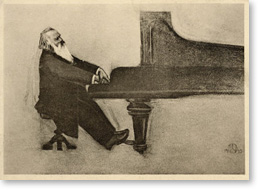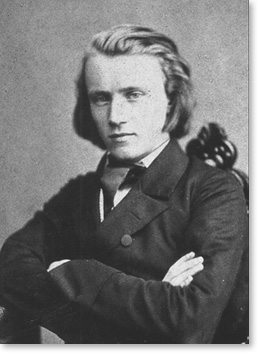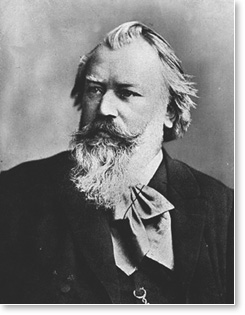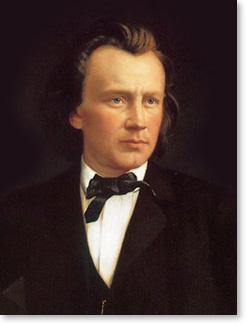Johannes Brahms
1833–1897 • Germany
In his early teens, to support his family, Brahms earned money playing in dance halls and inns around the docks in Hamburg — the same area and the kinds of places where the Beatles would develop their performing skills just over a century later. When Brahms was 20 he met the renowned violinist Joseph Joachim, who recognized his gifts and introduced him to the composer Robert Schumann.
Intermezzo – By Johannes Brahms
By his early 30s Brahms’s genius was widely recognized. Even his contemporaries spoke of the “three great B’s” — Bach, Beethoven, and Brahms. He spent much of his life in Vienna, the musical center of Europe. He wrote symphonies, concerti, chamber music, piano works, choral works, and more than 200 songs. A virtuoso pianist, he often performed his own compositions, either as a soloist or accompanist.
 Brahms was a preserver of tradition at a time when Romantic composers were breaking with tradition (his first symphony was hailed as “Beethoven’s Tenth”). Yet he was also an innovator, adding new elements to develop a powerful, energetic, and personal Romantic style.
Brahms was a preserver of tradition at a time when Romantic composers were breaking with tradition (his first symphony was hailed as “Beethoven’s Tenth”). Yet he was also an innovator, adding new elements to develop a powerful, energetic, and personal Romantic style.
Despite his financial success, he lived a very modest life. He gave money to relatives and anonymously supported aspiring young musicians. Like Beethoven, he loved taking long walks in the wooded areas around Vienna.
In 1889, Brahms was visited in Vienna by a representative of Thomas Edison, who asked him to make an experimental recording. The quality was poor — but this marked the first recording by a major composer.
In the following passages Brahms talks about his creative process:
To realize that we are one with the Creator, as Beethoven did, is a wonderful and awe-inspiring experience. Very few human beings ever come into that realization and this is why there are so few great composers or creative geniuses in any line of human endeavor. I always contemplate all this before commencing to compose. This is the first step. . . .
I immediately feel vibrations that thrill my whole being. . . . In this exalted state, I see clearly what is obscure in my ordinary moods; then I feel capable of drawing inspiration from above, as Beethoven did. . . .
Straightaway the ideas flow in upon me, . . . and not only do I see distinct themes in my mind’s eye, but they are clothed in the right forms, harmonies, and orchestrations. Measure by measure, the finished product is revealed to me when I am in those rare, inspired moods. . . . I have to be in a semi-trance condition to get such results — a condition when the conscious mind is in temporary abeyance and the subconscious is in control, for it is through the subconscious mind, which is part of Omnipotence, that the inspiration comes. I have to be careful, however, not to lose consciousness, otherwise the ideas fade away. [1]
[The term “subconscious”] is the most inappropriate name . . . super-conscious could be a much better term. [2]
The real genius draws on the Infinite source of Wisdom and Power as Milton and Beethoven did. That is, in my opinion, the best definition of genius. . . . Great powers like Goethe, Schiller, Milton, Tennyson and Wordsworth received the Cosmic vibrations of eternal Truths because they linked themselves to the infinite energy of the Cosmos. . . .
The themes that will endure in my compositions all come to me in this way. It has always been such a wonderful experience. . . . I felt that I was, for the moment, in tune with the Infinite, and there is no thrill like it. [3]
 Brahms possessed uncommon insight into the creative process and the origin of genius. All great achievement, he believed, is the expression of a field of infinite creativity and intelligence, “the infinite energy of the cosmos.” Human creativity and nature’s creativity have a common source, Brahms suggests.
Brahms possessed uncommon insight into the creative process and the origin of genius. All great achievement, he believed, is the expression of a field of infinite creativity and intelligence, “the infinite energy of the cosmos.” Human creativity and nature’s creativity have a common source, Brahms suggests.
For Brahms, this is more than philosophical speculation. He seeks to describe the unique state of awareness from within which his greatest compositions arise — a state, he makes clear, quite different from ordinary waking consciousness.
He characterizes it as an “exalted state” in which he is “capable of drawing inspiration from above.” He calls it “a semi-trance condition” in which “the conscious mind is in temporary abeyance.” In this state, he says, his mind opens to what he calls “the subconscious” — which he defines as “part of Omnipotence.” Later he says “superconscious” would a better word.
What is he describing? His words call to mind Maharishi’s description of the fifth state of consciousness, Cosmic Consciousness.
 Let’s review. During Transcendental Meditation practice, the mind settles inward and experiences what Maharishi calls Transcendental Consciousness, a fourth major state of consciousness, distinct from waking, dreaming, and sleeping. The mind is silent and serene, wide awake within itself. There are no perceptions, thoughts, or feelings, just consciousness in its pure state. Brain functioning is coherent and integrated. The body is deeply relaxed. In this state we experience the source of thought, an infinite reservoir of creativity and intelligence and bliss. Here, Maharishi observes, is the source of nature’s creativity and intelligence, the unified field of natural law described by quantum physics. This is our true Self.
Let’s review. During Transcendental Meditation practice, the mind settles inward and experiences what Maharishi calls Transcendental Consciousness, a fourth major state of consciousness, distinct from waking, dreaming, and sleeping. The mind is silent and serene, wide awake within itself. There are no perceptions, thoughts, or feelings, just consciousness in its pure state. Brain functioning is coherent and integrated. The body is deeply relaxed. In this state we experience the source of thought, an infinite reservoir of creativity and intelligence and bliss. Here, Maharishi observes, is the source of nature’s creativity and intelligence, the unified field of natural law described by quantum physics. This is our true Self.
When we first begin to meditate, we may have this experience only at the deepest moments of meditation. Over time, the mind becomes increasingly familiar with this state.
When we experience Transcendental Consciousness on a regular basis, twice a day, Maharishi explains, something extraordinary happens. This state begins to carry over into our life outside of meditation. Brain functioning remains integrated at all times. We begin to experience unbounded awareness coexisting with waking, dreaming, and sleeping, an unbroken continuum of experience deep within. The limitless ocean of creativity and intelligence at the source of thought is now available at all times. This, Maharishi observes, represents a fifth major state of consciousness, distinct from waking, dreaming, sleeping, and Transcendental Consciousness.
In the ordinary waking state, Maharishi explains, we do not experience thoughts until they reach the “surface” of the mind. In Cosmic Consciousness, one experiences thoughts at their inception, when they are most powerful, most fully imbued with the unbounded creative intelligence of their source.
 Brahms’s words certainly point in this direction. When he tells us he sometimes experiences a “superconscious” state in which his mind has access to a field of “omnipotence,” he suggests the fully awake state of Cosmic Consciousness, in which the mind is open to its source, the all-pervading, all-powerful field of nature’s creative intelligence. He felt his greatest music, “the themes that will endure,” came when his awareness remained settled and expanded even during the activity of composing — when he was “in tune with the Infinite.” This, he believes, is the source of all creative genius.
Brahms’s words certainly point in this direction. When he tells us he sometimes experiences a “superconscious” state in which his mind has access to a field of “omnipotence,” he suggests the fully awake state of Cosmic Consciousness, in which the mind is open to its source, the all-pervading, all-powerful field of nature’s creative intelligence. He felt his greatest music, “the themes that will endure,” came when his awareness remained settled and expanded even during the activity of composing — when he was “in tune with the Infinite.” This, he believes, is the source of all creative genius.
The fourth state of consciousness, Transcendental Consciousness, is simple and natural; everyone has the natural ability to experience it. The Transcendental Meditation technique provides an effortless way to do so. With regular experience of this state, Maharishi explains, Cosmic Consciousness develops spontaneously over time. Scientific research studies indicate what this looks like. Regular Transcendental Meditation practice leads to increased integration of brain functioning, increased creativity and intelligence, greater field independence (ability to focus on details while maintaining broad comprehension), and better health, among many other benefits.
Cosmic Consciousness brings another invaluable benefit. Because the mind is now open to the source of natural law, we live spontaneously in accord with natural law — meaning we no longer make mistakes, no longer create problems for ourselves and others. Instead we enjoy what Maharishi calls support of nature, enabling us to fulfill our desires without strain.
 Cosmic Consciousness, Maharishi asserts, is the normal state of human life. In this state, mind and body function as they were designed to function, free of stress, fully integrated and awake. Anything short of Cosmic Consciousness is less than normal.
Cosmic Consciousness, Maharishi asserts, is the normal state of human life. In this state, mind and body function as they were designed to function, free of stress, fully integrated and awake. Anything short of Cosmic Consciousness is less than normal.
Brahms gives us a glimpse of what this state can be. His experiences, though transitory, gave rise to some of the West’s greatest music.
Now this state, glimpsed and celebrated by creative geniuses through history, is systematically available to all. Who can imagine, as more and more people begin rising to this state, the creative accomplishment and the transformed world that will result?
REFERENCES
[1] Quoted in Arthur M. Abell, Talks with Great Composers (New York: Philosophical Library, 1955), 5–6.
[2] Abell, 9.
[3] Abell, 11.
__________________________________________________
 Dr. Craig Pearson is Executive Vice-President of Maharishi University of Management in Fairfield, Iowa. He has served the University in a variety of roles over the past 33 years, including Dean of Faculty, Dean of Students, Director of Maharishi University of Management Press, Director of Freshman Composition, and Professor of Professional Writing.
Dr. Craig Pearson is Executive Vice-President of Maharishi University of Management in Fairfield, Iowa. He has served the University in a variety of roles over the past 33 years, including Dean of Faculty, Dean of Students, Director of Maharishi University of Management Press, Director of Freshman Composition, and Professor of Professional Writing.
He holds a PhD in Maharishi Vedic Science from MUM and is the author of two books on the development of full human potential, The Complete Book of Yogic Flying and The Supreme Awakening: Developing the Infinite Potential Within (forthcoming). He is also a member of the Board of Directors of Maharishi School of the Age of Enlightenment.
Other posts by Craig Pearson:
“The kingdom of God is within you”
Henry David Thoreau – “We become like a still lake of purest crystal”
Alfred, Lord Tennyson – “A state of transcendent wonder”
Helen Keller – “I feel the flame of eternity in my soul”
Laozi – “His mind becomes as vast and immeasurable as the night sky”
Walt Whitman – “The luminousness of real vision”
Ralph Waldo Emerson – “Within man is the soul of the whole; the wise silence; the universal beauty”



